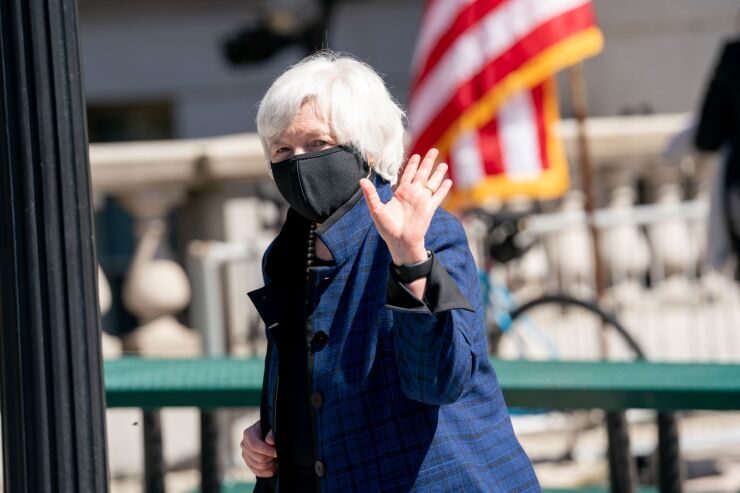WASHINGTON — Treasury Secretary Janet Yellen on Wednesday presided over her first Financial Stability Oversight Council meeting as chair, setting the stage for a potential recalibration of the body in the Biden administration.
Yellen highlighted three priorities for FSOC — created after the 2008 financial crisis — to explore as the U.S. examines financial vulnerabilities exposed by the pandemic, including nonbank financial intermediation, the resiliency of the U.S. Treasury market and emerging risks posed by climate change.
“We cannot only look back and learn the lessons of last year; we must also look ahead at emerging risks and climate change is obviously a big one,” said Yellen. “It’s an existential threat to our environment and it poses a tremendous risk to our country’s financial stability.”
Yellen also said she is establishing a “climate hub” at Treasury to focus on “the opportunities of climate finance to support the economy's transition to net-zero" carbon emissions.

The council members who made public remarks at the meeting indicated their support for FSOC exploring the issue of climate change. Those comments were in spite of
“In my view, the council should focus on the financial risks related to climate change, and each of us needs to manage that risk within our regulatory and supervisory frameworks,” said Todd Harper, the chairman of the National Credit Union Administration.
Federal Deposit Insurance Corp. Chair Jelena McWilliams added that her agency has “long expected” its supervised institutions to appropriately address potential climate risks.
“The FDIC will continue to monitor the impact of climate and other emerging risks on the financial industry,” she said. “We will continue to engage with other regulatory bodies, domestic and international, on how best to address such risks.”
Wednesday’s FSOC meeting also included an executive session closed to the public, in which members discussed hedge fund activity and mutual fund performance during the coronavirus pandemic. Yellen announced during the open session of the meeting that FSOC is reestablishing its hedge fund working group in order to “share data, identify risks and work to strengthen our financial system.”
"The fact that extreme policy interventions were still required [at the outset of the pandemic] to support market functioning should serve as a clear reminder [that] we have more to do to address vulnerabilities in the financial system," she said at the outset of the meeting.
The FSOC — which is chaired by the Treasury secretary and includes the heads of all the financial regulatory agencies — was established in the 2010 Dodd-Frank Act to identify potential risks to the financial system.
But the group became less active under former President Donald Trump. The Trump administration removed the last “systemically important financial institution” labels from nonbanks that had been designated under the Obama administration.
The FSOC also dramatically
Yellen





